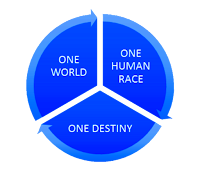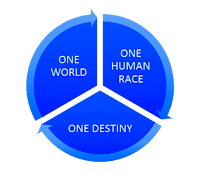JUST PHILOSOPHISING - ON THE WIDER IMPLICATIONS IRAQI KURDS INDEPENDENCE REFERENDUM VOTE! PART 2.
We can see the case of the creation of Pakistan, in 1947, as probably the most or one of the most glaring example of the failure of trying to create a new nation.
Based primarily on the religious and cultural commonality of the people who are to form the new nation.
Seventy years later, Pakistan and India are still at different levels of war with each other.
Primarily because of their religious and cultural differences, which have become more institutionalised through their now legitimised nationhood.
The state of Israel is probably another example. And we can look all around the world today, in Africa, in Asia, in the Far East, in Europe, in North and South America.
And we see tensions and even open conflict between people of different ethnic, religious and cultural backgrounds.
This is a fact of contemporary human living, and has been the case for centuries. It is a problem, at times a catastrophe, which needs to be improved and resolved.
But it is not one which is going to be resolved by different peoples wanting to create their own internationally and legally recognised countries.
Based primarily on the fact that they are the majority ethnic, religious and cultural group in their particular parts of the countries of which they form a part.
The doctrine of 'Bantustanism' is not a viable one for nation building in the Twenty First Century.
That is not to say, as I have argued, that more should not be being done to address the havoc which is being caused by ethnic and religious tensions and conflicts.
Which are taking place in probably all most countries of the world, to varying degrees.
Whether it is between Muslim and Muslim Nigerians, or Muslim and Christian Nigerians, Buddhists and Muslims in Myanmar, Sunni and Shias in the Middle East, et al, et alt.
It is just that separation of the the different ethnic and religious communities, although it might appear to be so, even temporarily, is not the solution.
That approach simple further reinforces the problem and ossifies it. It speaks of 'you in your little corner and me in mine.'
It speaks of human societies continuing to try to exist in discrete and unchanging, non-dynamic demographic conditions, or bubbles.
When, in fact, we live in a changing world. A world which we need to be proactively changing, and not simply being satisfied with being 'forced' to change with it.
It is true that the contemporary world is blighted by social and demographic conditions which have arisen both by forces of nature and as a result of how we organise and manage our living.
We need to continue to acknowledge and work at improving our control over these factors.
But, probably more than anything, we should not allow ourselves, as sentient and aspiring humans, to be controlled by these conditions. For example, our religious persuasion or our ethnic or cultural affiliation, in how we think of and strive for solutions.
To be continued.












Comments